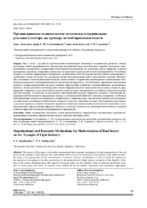| dc.contributor.author | Солодовников, С. Ю. | |
| dc.contributor.author | Сергиевич, Т. В. | |
| dc.coverage.spatial | Минск | ru |
| dc.date.accessioned | 2023-02-08T11:13:04Z | |
| dc.date.available | 2023-02-08T11:13:04Z | |
| dc.date.issued | 2023 | |
| dc.identifier.citation | Солодовников, С. Ю. Организационно-экономические механизмы модернизации реального сектора: на примере легкой промышленности = Organizational and Economic Mechanisms for Modernization of Real Sector: on the Example of Light Industry / С. Ю. Солодовников, Т. В. Сергиевич // Наука и техника. – 2023. – № 1. – С. 79-86. | ru |
| dc.identifier.uri | https://rep.bntu.by/handle/data/126109 | |
| dc.description.abstract | Цель статьи – разработка организационно-экономических механизмов модернизации реального сектора на примере легкой промышленности. Достижению поставленной цели способствовало решение следующих задач: исследование предпосылок модернизации отечественной промышленности; выявление рисков цифрового развития предприятия; выработка конкретных механизмов модернизации предприятий легкой промышленности Республики Беларусь в условиях цифровизации. Материалом для написания статьи послужили научные работы отечественных и зарубежных ученых последних лет, результаты научно-исследовательских работ, выполняемых авторами. Применялись системный и институциональный подходы, анализ и синтез. Разработаны организационно-экономические механизмы модернизации легкой промышленности, реализации которых будут способствовать: применение комплексного подхода к трансформации бизнес-модели в условиях цифровизации; разработка стратегии цифрового развития предприятия с учетом реальной и потенциальной степени цифровизации всех звеньев цепочки создания стоимости; формирование «цифрового ядра» фокальной компании, вокруг которого выстраивается сеть гибких децентрализованных производственных и сервисных подразделений; персонификация функций цифрового развития и обеспечения информационной безопасности предприятия; переход к омниканальной сбытовой стратегии; построение устойчивых интегрированных каналов коммуникации с потребителем в цифровой среде; производство контента как инструмент создания новых источников потребительной стоимости; переход к гибридным моделям, объединяющим виртуальные и реальные процессы создания стоимости; проработка механизмов использования возможностей накопления и комерциализации информационно-цифрового капитала; подготовка специалистов инженерно-экономического профиля в области цифровых технологий на промышленном предприятии. | ru |
| dc.language.iso | ru | ru |
| dc.publisher | БНТУ | ru |
| dc.title | Организационно-экономические механизмы модернизации реального сектора: на примере легкой промышленности | ru |
| dc.title.alternative | Organizational and Economic Mechanisms for Modernization of Real Sector: on the Example of Light Industry | ru |
| dc.type | Article | ru |
| dc.identifier.doi | 10.21122/2227-1031-2023-22-1-79-86 | |
| local.description.annotation | The purpose of the paper is to develop organizational and economic mechanisms for the modernization of the real sector on the example of light industry. The achievement of the set goal was facilitated by the solution of the following tasks: the study of the prerequisites for the modernization of domestic industry; identification of risks of digital development of the enterprise; development of specific mechanisms for the modernization of light industry enterprises of the Republic of Belarus in the context of digitalization. The material writing the paper was the scientific works of domestic and foreign scientists of recent years, the results of research work carried out by the authors. Systematic and institutional approaches, analysis and synthesis have been applied in the research. Organizational and economic mechanisms for the modernization of light industry have been developed, the implementation of which will be facilitated by: application of an integrated approach to the transformation of a business model in the context of digitalization; development of an enterprise digital development strategy, taking into account the actual and potential degree of digitalization of all links in the value chain; formation of a “digital core” of a focal company, around which a network of flexible decentralized production and service units is being built; personification of the functions of digital development and information security of the enterprise; transition to an omni-channel marketing strategy; building sustainable integrated channels of communication with the consumer in the digital environment; content production as a tool for creating new sources of consumer value; transition to hybrid models that combine virtual and real value creation processes; elaboration of mechanisms for using the opportunities for accumulation and commercialization of information and digital capital; training of engineering and economic specialists in the field of digital technologies at an industrial enterprise. | ru |

